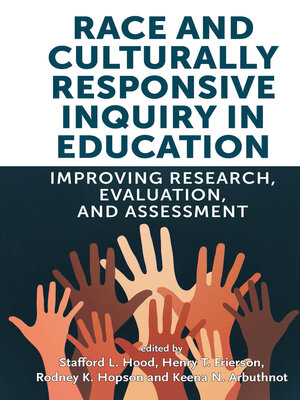Race and Culturally Responsive Inquiry in Education
ebook ∣ Improving Research, Evaluation, and Assessment · Race and Education
By Stafford L. Hood

Sign up to save your library
With an OverDrive account, you can save your favorite libraries for at-a-glance information about availability. Find out more about OverDrive accounts.
Find this title in Libby, the library reading app by OverDrive.



Search for a digital library with this title
Title found at these libraries:
| Library Name | Distance |
|---|---|
| Loading... |
Race and Culturally Responsive Inquiry in Education examines how assumptions about race and culture have shaped US education research and the interpretation and implementation of its results.
This ambitious volume sheds light on the detrimental effects of educational praxis and policies that have characterized communities of color and historically underserved communities as deficient. It reveals how such bias has affected many facets of educational inquiry, from research design and planning to education policy making and evaluation practices. The provocative essays in this work challenge traditional suppositions about whose evidence matters, highlighting approaches for reframing educational inquiry and arguing for the adoption of a culturally responsive stance that can correct inequities by accounting for students' diverse backgrounds and needs.
Edited by Stafford L. Hood, Henry T. Frierson, Rodney K. Hopson, and Keena N. Arbuthnot and featuring contributions from leading and emerging scholars, the collection is organized around three key areas—education research, educational assessment, and program evaluation. The contributors identify provocative problems that exist at the intersection of race and education in these areas, and they illuminate the many ways in which education reform can address intersectionality. Calling for effective action, they suggest compelling solutions for consideration by policy makers and practitioners as well as researchers.
Together, the essays in this volume make the case that culturally responsive methods that deepen our understanding of educational disparities, appropriately measure what students know and can do, and ensure that we have accurate information about the effectiveness of educational interventions can improve educational outcomes for diverse learners.







